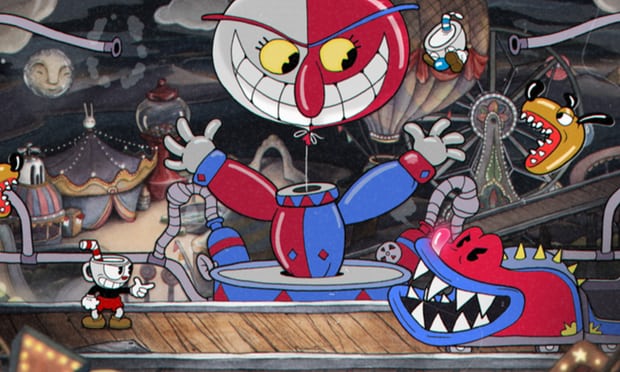
By CASEY STANFORD
Staff Writer
If you aren’t interested or involved in the world of gaming, you may not have heard the term “video game journalist,” but these reviewers significantly influence the success of games. Their importance was illustrated this month by an internet firestorm about gaming journalism, all of which exploded from a video of one journalist, Dean Takahashi, playing a game called Cuphead.
Upon the release of this video, which showed his first minutes of gameplay, Takahashi was bombarded by a torrent of criticism. Though he had intended the video to be a comedic show of his lack of skill, gamers were instead outraged by the fact that that he did not understand the basic gameplay mechanics and became stuck on parts of the tutorial. By Takahashi’s own admission, “It wasn’t just the troglodytes of the internet who hated it. Most people hated it.” Gamers raged with varying levels of sense and purpose about whether Takahashi deserved the “dream job” of being paid to play games. Though some compared their reaction to the Gamergate controversy, when gamers harassed a female developer falsely accused of sleeping with a journalist for a good review, these gamers were reacting to issues that had been brewing in the gaming world for a long time. In a time where many are concerned about a “dumbing down” of games, gamers saw Takahashi as a figurehead of a negative shift in their industry.
While their methods might have been less than civil, these gamers’ anger stemmed from pervasive issues in gaming journalism — not all of which were directly related to the Cuphead video. As Video Games Club President Shivakrishna Vasireddy (Sr.) put it, “Gaming journalism has had a problem with ethics for quite a while, specifically with the fact that they seem to have too close a relationship to the publishers that fund games.” Game publishers control which journalists get early access to their games, thus incentivizing journalists to give positive reviews to avoid losing these positive relationships. One example Vasireddy mentioned was the story of Jeff Gerstmann, a reviewer who gave a game a negative review and was fired from his job at Gamespot after the game’s publisher, a major Gamespot advertiser, complained. Though Gamespot stated that the firing was unconnected, Gerstmann claimed it was a direct result, and multiple editors left the company because they were unwilling to work for a company willing to cave to such publisher pressures. Over time, practices of this sort have transformed much of the game journalism industry into a feedback loop of positive reviews, choosing profitability and good relations over truthfulness.
Incompetence, as in the case of Cuphead, is another important problem disconnecting the game journalism industry from its consumers’ needs, as many critics of Takahashi’s pointed out. In 2007 he gave the otherwise acclaimed Mass Effect a negative review after failing to realize he could upgrade his characters, one of the game’s key mechanics. In his original Cuphead preview, he mentioned that it took him some time to realize that you could not jump on enemies like in Mario games, despite the player having a weapon. However, incompetence is not limited to just Takahashi as a schism exists between game journalists and their audience, and while it isn’t as pervasive a problem as the incentive structure, debacles of this sort are regular. One recent case from May of 2016 was the Polygon Doom review, when, similarly to Cuphead, gaming website Polygon put up a review of the new game Doom with such a floundering and incompetent video to go along with it that it was immediately mocked by most parts of the gaming internet. Though the Cuphead and Doom reviews share many traits, the most important one is the way they illustrate how little game journalism publications understand their audience – sharing failures proudly instead of actually choosing competent reviewers well-versed in the genres they cover.
Ultimately, any one flawed game review isn’t the point. The Cuphead review provided a convenient outlet for gamers to express long-brewing concerns over consistent patterns of failure by game journalists. The game journalism industry is still expanding, and it needs to be sustained by accurate coverage and reviews. The current methods of creation and distribution for game reviews, as well as the people and companies reviewing them make that virtually impossible, as: a) journalistic websites find it understandably hard to be objective when they depend on the same publishers whose games they review for both advertising and early access to those games, and b) footage and poorly assigned reviews pass through layers of non-gaming editors and corporate officials with no connection to their pieces’ intended audience. Both incompetence and conflicts of interest are critical issues in the game journalism industry, both show the ways in which the people who write reviews are disconnected from the needs of their audience, and both need to be taken seriously and substantively addressed. While much of the hate directed at Takahashi was excessive, it was motivated by concerns about both of these issues, and helped bring them to light and started a discussion about why the industry is broken and how it needs to change. It is important for the industry to take the complaints of gamers seriously instead of dismissing the entire issue because some of them attack a person instead of a problem. The gaming journalism industry is fundamentally broken in multiple ways right now, and until it undergoes serious change, it will be unable to act with both the journalistic privilege it needs and the journalistic accuracy that gamers need.









Lucas F • Jun 14, 2018 at 8:30 am
I completely understand the argument but I would have to believe that if the reviewer isnt good at video games people will just stop watching him/her.
What is you opinion on video game walkthrough’s vs reviews? In my experience that walkthrough’s provide a lower level of skill over reviewing a game.